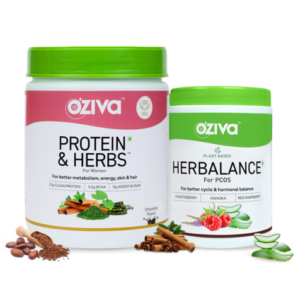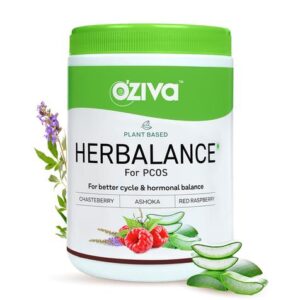PCOS stands for Polycystic Ovary Syndrome. The syndrome occurs when a female produces an excess of male hormones, commonly known as androgen. The female may witness harsh symptoms of PCOS for several reasons. Diabetes and obesity are the primary ones.
Scientifically speaking, PCOS is a hormonal disorder affecting over 10 million women every year in the world. David A. Ehrmann, MD, director of the University of Chicago Centre for PCOS in Illinois refers to this syndrome as reproductive metabolism syndrome – as reproductive abnormalities are the major reason for it.
A PCOS-infected woman deals with symptoms such as acne, stray hairs, weight gain, period problems, and other symptoms. Hence, learning about how to effectively deal with these issues is crucial. If PCOS isn’t detected and treated in time, it may have long-term consequences and cause pain throughout your life. And so, opting for the right diagnosis for existing satisfaction, long-term health, and forthcoming plans to have a family is much needed. The first step, however, is to have a piece of good knowledge about its symptoms.
Signs & Symptoms
The symptoms of PCOS can occur in numerous ways. However, it varies from one person to another. Not every woman will experience the same signs. While some may witness mild symptoms, others may encounter serious issues. Symptoms also depend on the different stages of PCOS as well.
Symptoms of PCOS may include:
- Periods & Reduced fertility: The first and the major symptom of PCOS is period irregularities. No periods, also the periods with irregular, infrequent and heavy immature ovarian eggs can lead to infertility – or multiple pregnancy problems. It is not necessary that women with PCOS cannot have the same number of children as women without PCOS disorder. However, there are a few cases where PCOS-infected women need infertility treatment to get pregnant. Women with PCOS have high androgen levels and insulin levels that result in an uneven menstrual cycle and can also prevent the discharge of an egg from the ovary during periods (Ovulation). Thus, it becomes very difficult for women to get pregnant naturally without any medical assistance. As per medical experts, women with PCOS have a higher risk of pregnancy complications after they get pregnant.
- Excess Hair Growth and Acne on face and body: Up next, the second symptom one may observe once they are infected with PCOS are excess facial or body hair growth; acne on the face and sometimes dark patches. The condition where one can notice excess hair growth on the face and body (this hair can be thick and dark as men) is known as Hirsutism. It occurs due to the high-level production of androgen during PCOS. The hair generally grows on the area where men grow hair, such as the chin, upper lips (moustache), the sideburn area, around nipples, lower abdomen, thighs, and chest. It has been found that almost 60% of the women with PCOS tend to suffer from hirsutism. Further, due to the high production of androgen, the production of the oil-producing gland gets doubled. Thus, resulting in acne and patches on the skin. These acne are not ordinary ones though; they leave dark patches of skin, especially on the neck, groin, and under the breast region.
- Mental & emotional health: Mood swings, stress, depression, and anxiety are the major symptoms one may notice while PCOS. It is due to the hormonal changes that happen in the body. And, it is believed that hormonal changes often lead to anxiety and stress. However, it is not certain why women with PCOS have a higher possibility of emotional challenges. Higher androgens level symptoms can add to depression and anxiety levels especially when there are some problems with fertility. It can even affect the mood, mainly if fertility has prevailed as a concern for a long time.
- Related health conditions: Last and the most highly anticipated symptom is sleep. During PCOS, abnormal halts of breathing occur during sleep. It may incline to a high risk of diabetes, with short onset sexual health challenges, and an improved chance of heart disorder.
What happens if you have PCOS?
Below mentioned is the list of complications one may have to go through. PCOS symptoms vary extensively based on the individual woman:
- Miscarriage or even premature birth
- Infertility
- Abnormal uterine bleeding
- Nonalcoholic steatohepatitis is a liver disorder caused by fat aggregation.
- Gestational diabetes or pregnancy-induced high blood pressure
- Metabolic syndrome
- Type 2 diabetes or prediabetes
- Sleep apnea
- Depression, anxiety
- Various eating disorders
- Endometrial cancer (cancer on the uterine wall)
- Obesity
Is it a serious problem?
PCOS is not a life-threatening disease. However, it can be very dangerous after a certain level. As aforesaid, it is a sort of hormonal disorder that affects females as they start to produce male hormones in higher amounts. It can be cured if catered to well and caught sight of within time. OZiva Plant Based HerBalance for PCOS is a clean, plant-based treatment that is extremely helpful if one wants to cater to the signs and symptoms of PCOS. The product contains 9 standardised Herbal Extracts like Red Raspberry, Rhodiola Rosea, Chasteberry, and more that help aid Hormonal Balance.
Excess insulin production is one of the major PCOS causes – as it stimulates more production of male hormones, which may result in infertility. To avoid the consequences, Oziva Herbalance for PCOS can be consumed. It contains 50 mcg of Chromium per serving and 500 mg of Vitamin B8 (Inositol) that may help improve the fertility rate.
It not only helps reduce and effectively manage PCOS symptoms but also helps reduce hormonal imbalances and menstrual cramps, if coupled with a clean, balanced lifestyle, and exercise.
How to treat PCOS?
There are various methods of PCOS treatment, including both diet and lifestyle or medicinal treatment – even surgeries. One of the suggested lifestyle ways to treat PCOS is by losing weight. Cutting just 7-15 kgs from your actual body weight can reduce the symptoms of PCOS (there are some exceptions as well if the PCOS stage has reached higher levels). Also, another major hack for treating PCOS is consuming a low carbohydrate diet. It has been found that low carbohydrate diets are beneficial both for weight loss and reduced insulin levels. Thus, stopping the production of androgens.
As per the studies, it has been believed that 30 minutes of regular moderate-intensity exercise can benefit women with PCOS to lose weight. Exercising not only helps lose weight but also improves ovulation and insulin levels. The OZiva Plant Based HerBalance for PCOS is also beneficial for treating PCOS. It comprises several herbal extracts that help maintain hormonal balance and reduce insulin production. Other products which help reduce symptoms of PCOS are Bettr.Zinc+ for acne.
Conclusion
PCOS, nowadays, is a very common and widely known syndrome affecting women all around the world. It hinders a woman’s menstrual cycle and makes it complicated for them to conceive. The formation of androgens in high quantities causes various problems, as mentioned earlier. Due to these changes, women start to feel insecure. Thus, it leads to numerous mental illnesses. Consequently, it’s now extremely important to recognize the disorders in time – and opt for medical treatment. There are some products one may also opt for before undergoing medical treatment, such as the Oziva plant-based HerBalance for PCOS, which is a natural PCOS cure or treatment for the symptoms. However, it is always advisable for every PCOS sufferer to consult a doctor before any home remedies.
Read more blogs on PCOS here.
Last modified: August 30, 2022




